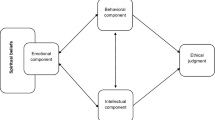Abstract
Increased integration and competitiveness in today’s fast paced world has led to an amalgamation of people, processes and places. Such engrained integration diminishes both geographical and time-based boundaries. People across different age groups, ethnicity, culture, origin and professions work 24 × 7 and hardly get time for self-analysis, to introspect on thoughts about their existence, purpose and meaning of life. However, these are of utmost importance in determining the quality of life of an individual. Keeping this requirement (for higher societal good) in mind, the present study aims to explore various correlates of the subtle, yet deeply held notion of spirituality. Researchers have chosen to study young adults (postgraduate management students) using Grounded Theory approach, a qualitative analysis technique. Data have been coded and categorized for meaningful analysis to understand the notion of ‘Spirituality’ from the perspective of young adults—budding future corporate managers. Results present details about the nature and diversity of meanings of spirituality. The concept has emerged out as an integrated and ever-evolving ideology, developing out of an appropriate context. The paper also discusses different shades of spirituality with an emphasis on its perceived factors of formation and the corresponding perceived impact.
Similar content being viewed by others
Notes
In fact, spirituality and related issues of soul and metaphysics were discussed even in the pre-Socratic period in Greek philosophy. These debates even predate in Buddhist and ancient Indian streams of thought.
References
Bruce S (1996) Religion in the modern world. Oxford University Press, Oxford
Campuzano LG, Seteroff SS (2009) A new approach to a spiritual business organization and employee satisfaction. Eastern Academy of Management. doi:10.2139/ssrn.1553426
Coyle J (2002) Spirituality and health: towards a framework for exploring the relationship between spirituality and health. J Adv Nurs 37:589–597
Duchon D, Plowman DA (2005) Nurturing the spirit at work: impact on work unit performance. Leadersh Q 16:807–833
Dyer W (2001) There is a spiritual solution to every problem. Harper Collins, London
English LM, Gillen MA (2000) Addressing the spiritual dimensions of adult learning: what educators can do. Jossey-Bass, San Francisco
Epstein E (2002) Religion and business—the critical role of religious traditions in management education. J Bus Ethics 38:91–96
Freshman B (1999) An exploratory analysis of definitions and applications of spirituality in the workplace. J Organ Change Manag 12(4):318–327
Fry LW (2003) Toward a theory of spiritual leadership. Leadersh Q 14(6):693–727
Giacalone RA, Jurkiewicz CL (2003) Toward a science of workplace spirituality. In: Giacalone RA, Jurkiewicz CL (eds) Handbook of workplace spirituality and organizational performance. Sharp, New York, pp 3–28
Giacalone RA, Jurkiewicz CL, Fry LW (2005) From advocacy to science: the next steps in workplace spirituality research. In: Paloutzian R (ed) Handbook of the psychology of religion and spirituality. Sage, Newbury Park, CA, pp 515–528
Glaser BG, Strauss AL (1999) The discovery of grounded theory: strategies for qualitative research. AldineTransaction Publication, New Brunswick
Guillory WA (2000) The living organization: spirituality in the workplace. Innovations International Inc, Salt lake City
Gull GA, Doh J (2004) The “transmutation” of the organization: toward a more spiritual workplace. J Manag Inq 13(2):128–139
Holder MD, Coleman B, Wallace JM (2010) Spirituality, religiousness, and happiness in children aged 8–12 years. J Happiness Stud 11(2):131–150
Hope SL, Speck BW (2007) Searching for spirituality in higher education. Peter Lang, New York
Jurkiewicz CL, Giacalone RA (2004) A values framework for measuring the impact of workplace spirituality on organizational performance. J Bus Ethics 49:129–142
Karakas F (2010) Spirituality and performance in organizations: a literature review. J Bus Ethics 94(1):89–106
Kellhear A (2000) Spirituality and palliative care: a model of needs. Palliat Med 14:149–155
Kim SS, Kim-Godwin YS, Koeing HG (2016) Family spirituality and family health among Korean-American elderly couples. J Relig Health 55(2):729–746
King U (1992) Spirituality, society and culture. Way Suppl 73:14–23
King PE, Clardy CE, Sán J (2014) Adolescent spiritual exemplars: exploring spirituality in the lives of diverse youth. J Adolesc Res 29(2):186–212
Kinjerski V, Skrypnek BJ (2004) Defining spirit at work: finding common ground. J Organ Change Manag 17:26–42
Krishnakumar S, Neck CP (2002) The “what” and “how” of spirituality in the workplace. J Manag Psychol 17(3):153–164
McCormick DW (1994) Spirituality and management. J Manag Psychol 9(6):5–8
Milliman J, Czaplewski AJ, Ferguson J (2003) Workplace spirituality and employee work attitudes: an exploratory empirical assessment. J Organ Change Manag 16(4):426–447
Mitroff II, Denton EA (1999) A study of spirituality in the workplace. Sloan Manag Rev 40(4):83–92
Mooney B, Timmins F (2007) Spirituality as a universal concept: student experience of learning about spirituality through the medium of art. Nurse Educ Pract 7(5):275–284
Naylor TH, Willimon WH, Osterberg R (1996) The search for meaning in the workplace. Abington Press, Nashville
Shelly I, Fish S (1988) Spiritual care: the nurse’s role. Inter-Varsity Press, Downer’s Grove
Singleton A, Mason M, Webber R (2004) Spirituality iin adolescence and young adulthood: a method for qualitative study. Int J Child Spirit 9(3):247–262
Strauss AL, Corbin J (1998) Basics of qualitative research: grounded theory procedures and techniques. Sage, London
Vygotsky S (1978) Mind and society: the development of higher mental processes. Harvard University Press, Cambridge
Yasuno M (2008) The role of spirituality in leadership for social change. Spirit High Educ 4(3):1–8
Zinnbauer BJ, Pargament KI, Scott AB (1999) The emerging meanings of religiousness and spirituality: problems and prospects. J Pers 67:889–919
Author information
Authors and Affiliations
Corresponding author
Rights and permissions
About this article
Cite this article
Singh, R.K., Hira, R. Exploring notion of Spirituality using Grounded Theory: Young adult’s perspective. Decision 44, 171–178 (2017). https://doi.org/10.1007/s40622-017-0151-y
Published:
Issue Date:
DOI: https://doi.org/10.1007/s40622-017-0151-y




